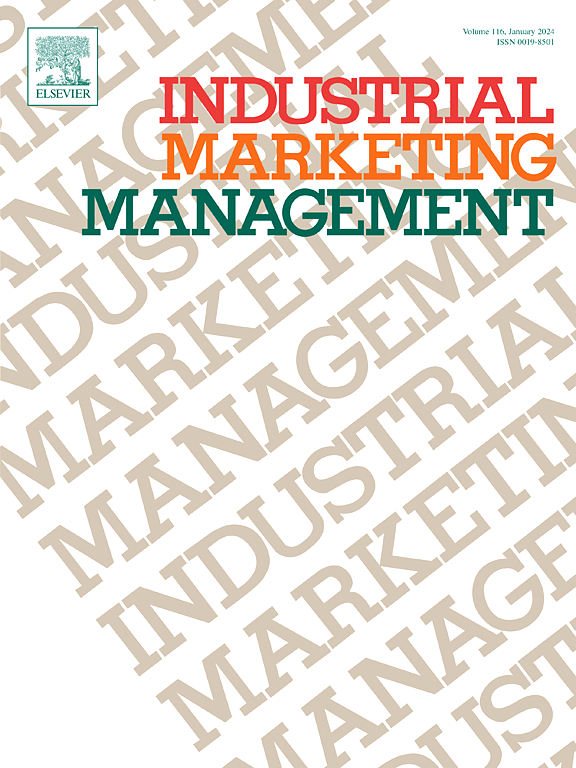Organisational agility for new industrial marketing management models in turbulent times
IF 7.5
1区 管理学
Q1 BUSINESS
引用次数: 0
Abstract
In an era of systemic disruption and rapid technological change, organisational agility is a strategic imperative for business-to-business (B2B) firms. This special issue brings together ten studies that examine how agility is conceptualised, enacted, and sustained across diverse B2B settings. Agility thus emerges as a multidimensional capability encompassing strategic sensing, digital transformation, inclusive leadership, and inter-organisational collaboration. The articles also explore how generative and agentic artificial intelligence (AI) reshape agility by enabling adaptive decision-making, ecosystem orchestration, and new forms of human–AI collaboration. From AI-driven ecosystems in Australasia to agile supply chains in Africa and leadership responses in Europe, the articles reflect the global diversity of agile practices. This editorial synthesises key insights and outlines seven directions for future research: (1) agility-sustainability integration, (2) digital transformation and agility, (3) leadership agility and capability development, (4) ecosystem-level agility using agentic AI, (5) human-cantered agility in the age of generative and agentic AI, (6) the temporal evolution of agility in AI-augmented organisations, and (7) responsible and context-aware agility in the age of generative and agentic AI. Together, these contributions reposition agility as a proactive, ethically grounded enabler of innovation, resilience, and inclusive growth in industrial marketing.
在动荡时期,新的工业营销管理模式的组织敏捷性
在一个系统破坏和快速技术变革的时代,组织敏捷性是企业对企业(B2B)公司的战略要求。本期专题汇集了十项研究,探讨了敏捷是如何在不同的B2B环境中概念化、实施和维持的。因此,敏捷性作为一种多维能力出现,包括战略感知、数字化转型、包容性领导和组织间协作。文章还探讨了生成和代理人工智能(AI)如何通过实现自适应决策、生态系统编排和新形式的人类-人工智能协作来重塑敏捷性。从大洋洲的人工智能驱动生态系统到非洲的敏捷供应链,再到欧洲的领导力响应,这些文章反映了敏捷实践的全球多样性。这篇社论综合了关键见解并概述了未来研究的七个方向:(1)敏捷性-可持续性集成,(2)数字化转型和敏捷性,(3)领导力敏捷性和能力发展,(4)使用人工智能的生态系统级敏捷性,(5)生成和代理人工智能时代以人为中心的敏捷性,(6)人工智能增强组织中敏捷性的时间演变,以及(7)生成和代理人工智能时代负责任和上下文感知的敏捷性。总之,这些贡献将敏捷性重新定位为工业营销中创新、弹性和包容性增长的积极的、基于道德的推动者。
本文章由计算机程序翻译,如有差异,请以英文原文为准。
求助全文
约1分钟内获得全文
求助全文
来源期刊

Industrial Marketing Management
Multiple-
CiteScore
17.30
自引率
20.40%
发文量
255
期刊介绍:
Industrial Marketing Management delivers theoretical, empirical, and case-based research tailored to the requirements of marketing scholars and practitioners engaged in industrial and business-to-business markets. With an editorial review board comprising prominent international scholars and practitioners, the journal ensures a harmonious blend of theory and practical applications in all articles. Scholars from North America, Europe, Australia/New Zealand, Asia, and various global regions contribute the latest findings to enhance the effectiveness and efficiency of industrial markets. This holistic approach keeps readers informed with the most timely data and contemporary insights essential for informed marketing decisions and strategies in global industrial and business-to-business markets.
 求助内容:
求助内容: 应助结果提醒方式:
应助结果提醒方式:


